Module2 Unit 4 Natural disasters 第1课时 Vocabulary习题课件(共18张PPT)
文档属性
| 名称 | Module2 Unit 4 Natural disasters 第1课时 Vocabulary习题课件(共18张PPT) | 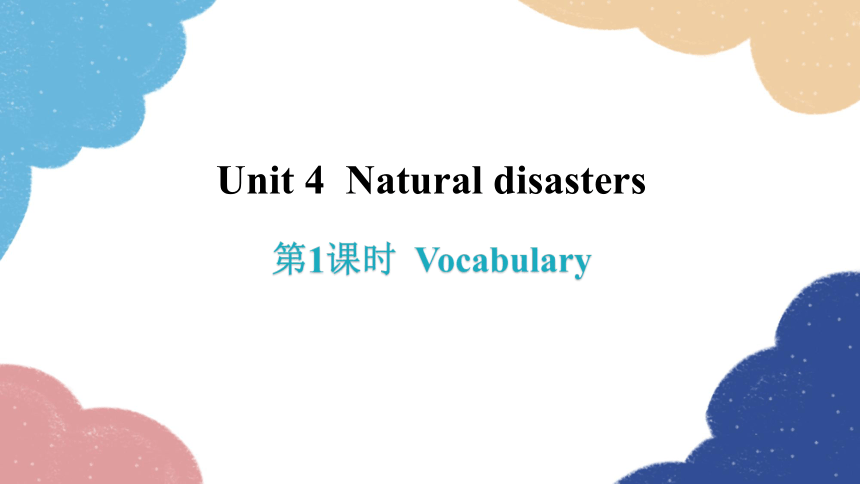 | |
| 格式 | pptx | ||
| 文件大小 | 393.0KB | ||
| 资源类型 | 教案 | ||
| 版本资源 | 牛津深圳版 | ||
| 科目 | 英语 | ||
| 更新时间 | 2022-10-04 11:30:51 | ||
图片预览

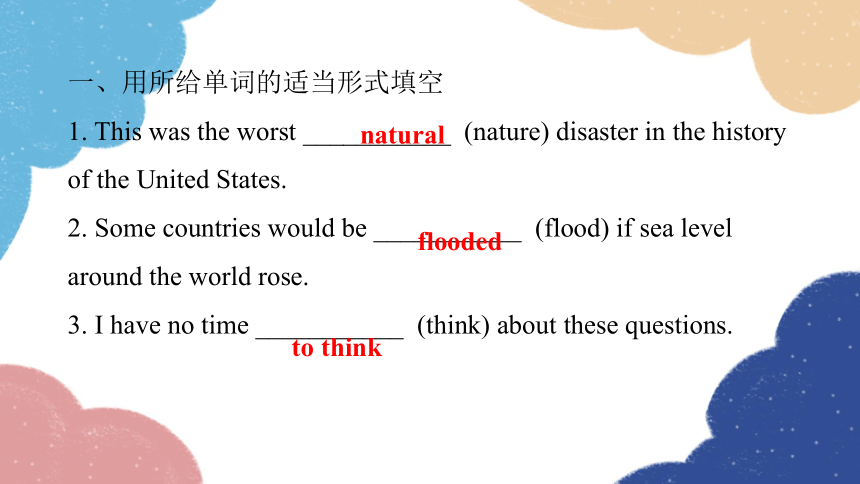
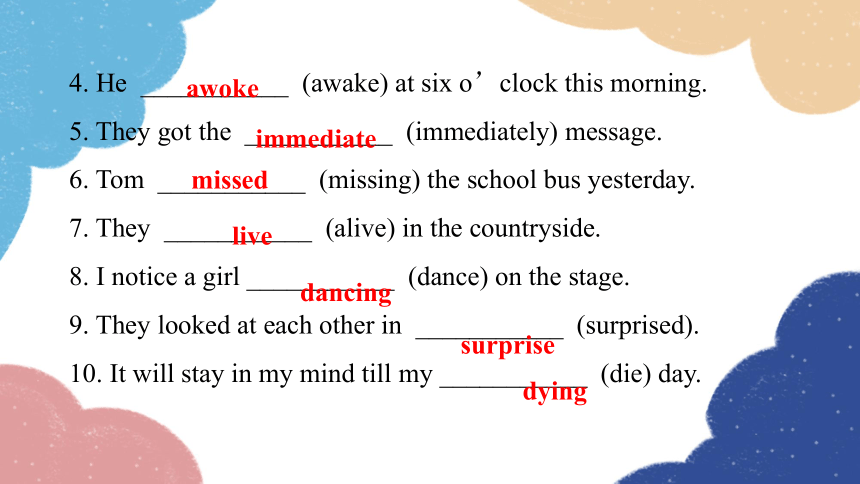
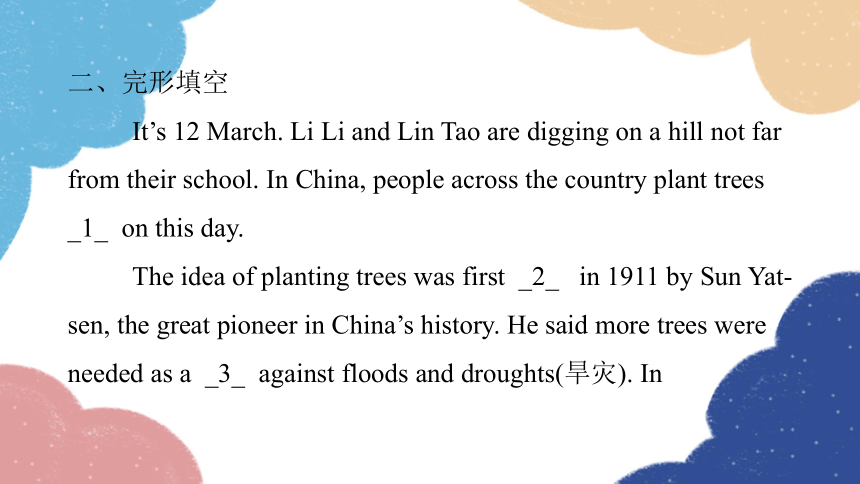

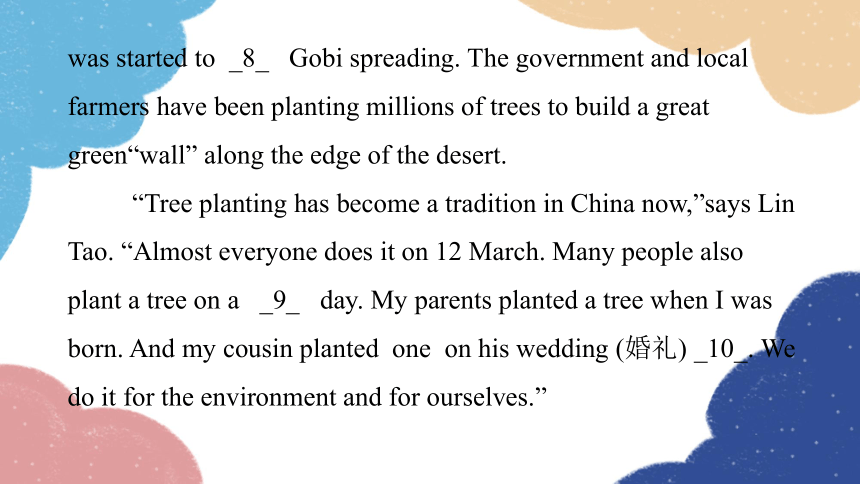
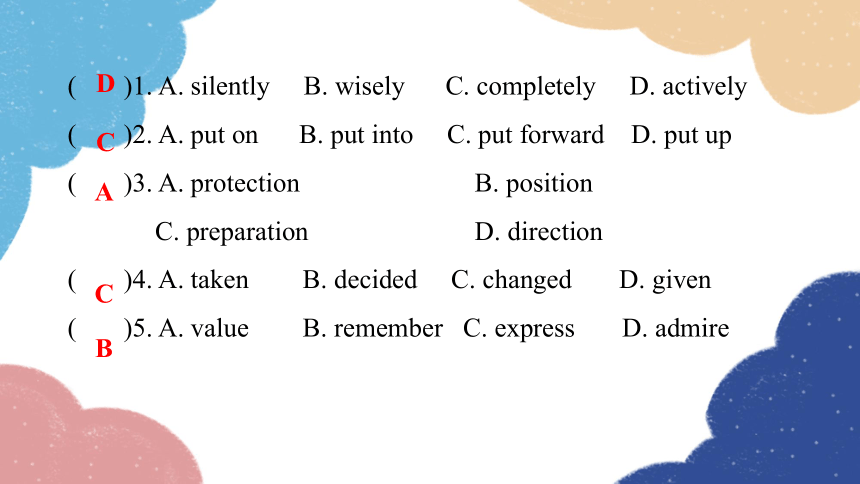
文档简介
(共18张PPT)
Unit 4 Natural disasters
第1课时 Vocabulary
一、用所给单词的适当形式填空
1. This was the worst ___________ (nature) disaster in the history of the United States.
2. Some countries would be ___________ (flood) if sea level around the world rose.
3. I have no time ___________ (think) about these questions.
natural
flooded
to think
4. He ___________ (awake) at six o’clock this morning.
5. They got the ___________ (immediately) message.
6. Tom ___________ (missing) the school bus yesterday.
7. They ___________ (alive) in the countryside.
8. I notice a girl ___________ (dance) on the stage.
9. They looked at each other in ___________ (surprised).
10. It will stay in my mind till my ___________ (die) day.
awoke
immediate
missed
live
dancing
surprise
dying
二、完形填空
It’s 12 March. Li Li and Lin Tao are digging on a hill not far from their school. In China, people across the country plant trees _1_ on this day.
The idea of planting trees was first _2_ in 1911 by Sun Yat-sen, the great pioneer in China’s history. He said more trees were needed as a _3_ against floods and droughts(旱灾). In
1915, 5 April was named as Tree Planting Day. Then, in 1979, the day _4_ to 12 March, to _5_ the date on which Sun Yat-sen died.
“Everyone has heard of the Great Wall of China,”says Li Li. “But have you heard of the Green Wall of China That’s the biggest tree planting _6_ of all.”The Gobi Desert in the North of China was _7_ every year. So in 1978, a tree planting project
was started to _8_ Gobi spreading. The government and local farmers have been planting millions of trees to build a great green“wall” along the edge of the desert.
“Tree planting has become a tradition in China now,”says Lin Tao. “Almost everyone does it on 12 March. Many people also plant a tree on a _9_ day. My parents planted a tree when I was born. And my cousin planted one on his wedding (婚礼) _10_. We do it for the environment and for ourselves.”
( )1. A. silently B. wisely C. completely D. actively
( )2. A. put on B. put into C. put forward D. put up
( )3. A. protection B. position
C. preparation D. direction
( )4. A. taken B. decided C. changed D. given
( )5. A. value B. remember C. express D. admire
D
C
A
C
B
( )6. A. research B. survey C. project D. purpose
( )7. A. growing B. appearing C. losing D. happening
( )8. A. keep B. have C. help D. stop
( )9. A. different B. special C. basic D. simple
( )10. A. day B. week C. month D. year
C
A
D
B
A
三、阅读理解
A few months ago when we had some big storms through our area, my volunteering work became much busier and harder. We lost electricity for several days, and I sat in the dark telling the noisy and crying children to cheer up. Would I get discouraged for this Of course not. Knowing the fact that I was doing something helpful made me full of energy.
A colleague came to me, telling me about a poor family with four kids. Their roof (屋顶) had been destroyed by lightning and they needed help. I joined him immediately. There was a hole in the kitchen ceiling(天花板) and the whole house was getting flooded. The colleague went to repair the hole. I opened the front and the back doors to create a path for the water.
The children cried every time thunder and lightning came. To calm (使……镇静) them down, I explained that God made noises when he clapped his hands (鼓掌). I let them know God was just trying to remind them by doing this so that he could take their pictures. It was useful. Their little faces lit up.
I heard the kids also passed along the secret to the class. When thunder came again, the kids never cried and all started
checking their clothes. They told the teacher they would look nice when God took pictures. The teacher explained to them that thunder came when two clouds hit each other and that in reality there was no God. A little girl said, “God is going to take your picture. So, you’d better get ready.” I had a good laugh out of that.
( )1. How did the author feel about her work according to Paragraph 1
A. It was exciting but dangerous.
B. It was difficult but meaningful.
C. It was relaxing and funny.
D. It was boring and useless.
B
( )2. What happened to the family with four kids
A. The kids failed to attend school.
B. The road to their house was flooded.
C. Their house was damaged because of the bad weather.
D. They went cold and hungry because of being poor.
C
( )3. Why did the author tell the children about God
A. Because she tried to reduce their fear.
B. Because she encouraged them to show kindness.
C. Because she hoped they could get more knowledge.
D. Because she believed God could bring good luck to them.
A
( )4. What does the underlined sentence in Paragraph 3 mean
A. They became excited.
B. They felt more fearful.
C. The thunder lit up their faces.
D. Their faces looked more beautiful.
A
( )5. What can we know from the last paragraph
A. The kids were too young to learn science.
B. The author was successful in educating children.
C. The teacher lied to the kids about the truth of thunder.
D. The kids preferred to understand thunder in the author’s way.
D
THANKS!
Unit 4 Natural disasters
第1课时 Vocabulary
一、用所给单词的适当形式填空
1. This was the worst ___________ (nature) disaster in the history of the United States.
2. Some countries would be ___________ (flood) if sea level around the world rose.
3. I have no time ___________ (think) about these questions.
natural
flooded
to think
4. He ___________ (awake) at six o’clock this morning.
5. They got the ___________ (immediately) message.
6. Tom ___________ (missing) the school bus yesterday.
7. They ___________ (alive) in the countryside.
8. I notice a girl ___________ (dance) on the stage.
9. They looked at each other in ___________ (surprised).
10. It will stay in my mind till my ___________ (die) day.
awoke
immediate
missed
live
dancing
surprise
dying
二、完形填空
It’s 12 March. Li Li and Lin Tao are digging on a hill not far from their school. In China, people across the country plant trees _1_ on this day.
The idea of planting trees was first _2_ in 1911 by Sun Yat-sen, the great pioneer in China’s history. He said more trees were needed as a _3_ against floods and droughts(旱灾). In
1915, 5 April was named as Tree Planting Day. Then, in 1979, the day _4_ to 12 March, to _5_ the date on which Sun Yat-sen died.
“Everyone has heard of the Great Wall of China,”says Li Li. “But have you heard of the Green Wall of China That’s the biggest tree planting _6_ of all.”The Gobi Desert in the North of China was _7_ every year. So in 1978, a tree planting project
was started to _8_ Gobi spreading. The government and local farmers have been planting millions of trees to build a great green“wall” along the edge of the desert.
“Tree planting has become a tradition in China now,”says Lin Tao. “Almost everyone does it on 12 March. Many people also plant a tree on a _9_ day. My parents planted a tree when I was born. And my cousin planted one on his wedding (婚礼) _10_. We do it for the environment and for ourselves.”
( )1. A. silently B. wisely C. completely D. actively
( )2. A. put on B. put into C. put forward D. put up
( )3. A. protection B. position
C. preparation D. direction
( )4. A. taken B. decided C. changed D. given
( )5. A. value B. remember C. express D. admire
D
C
A
C
B
( )6. A. research B. survey C. project D. purpose
( )7. A. growing B. appearing C. losing D. happening
( )8. A. keep B. have C. help D. stop
( )9. A. different B. special C. basic D. simple
( )10. A. day B. week C. month D. year
C
A
D
B
A
三、阅读理解
A few months ago when we had some big storms through our area, my volunteering work became much busier and harder. We lost electricity for several days, and I sat in the dark telling the noisy and crying children to cheer up. Would I get discouraged for this Of course not. Knowing the fact that I was doing something helpful made me full of energy.
A colleague came to me, telling me about a poor family with four kids. Their roof (屋顶) had been destroyed by lightning and they needed help. I joined him immediately. There was a hole in the kitchen ceiling(天花板) and the whole house was getting flooded. The colleague went to repair the hole. I opened the front and the back doors to create a path for the water.
The children cried every time thunder and lightning came. To calm (使……镇静) them down, I explained that God made noises when he clapped his hands (鼓掌). I let them know God was just trying to remind them by doing this so that he could take their pictures. It was useful. Their little faces lit up.
I heard the kids also passed along the secret to the class. When thunder came again, the kids never cried and all started
checking their clothes. They told the teacher they would look nice when God took pictures. The teacher explained to them that thunder came when two clouds hit each other and that in reality there was no God. A little girl said, “God is going to take your picture. So, you’d better get ready.” I had a good laugh out of that.
( )1. How did the author feel about her work according to Paragraph 1
A. It was exciting but dangerous.
B. It was difficult but meaningful.
C. It was relaxing and funny.
D. It was boring and useless.
B
( )2. What happened to the family with four kids
A. The kids failed to attend school.
B. The road to their house was flooded.
C. Their house was damaged because of the bad weather.
D. They went cold and hungry because of being poor.
C
( )3. Why did the author tell the children about God
A. Because she tried to reduce their fear.
B. Because she encouraged them to show kindness.
C. Because she hoped they could get more knowledge.
D. Because she believed God could bring good luck to them.
A
( )4. What does the underlined sentence in Paragraph 3 mean
A. They became excited.
B. They felt more fearful.
C. The thunder lit up their faces.
D. Their faces looked more beautiful.
A
( )5. What can we know from the last paragraph
A. The kids were too young to learn science.
B. The author was successful in educating children.
C. The teacher lied to the kids about the truth of thunder.
D. The kids preferred to understand thunder in the author’s way.
D
THANKS!
